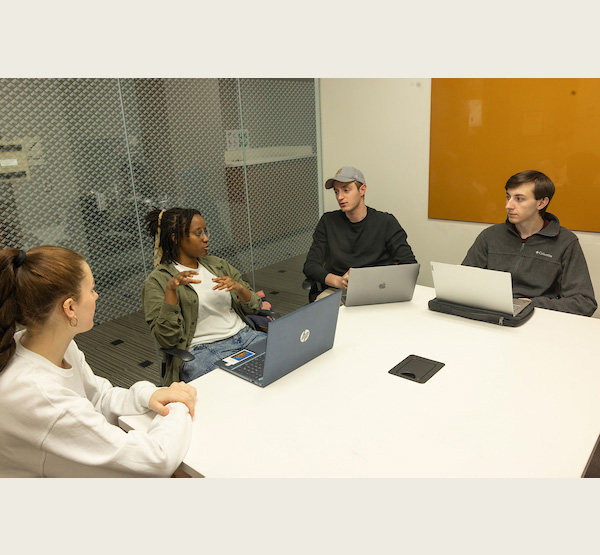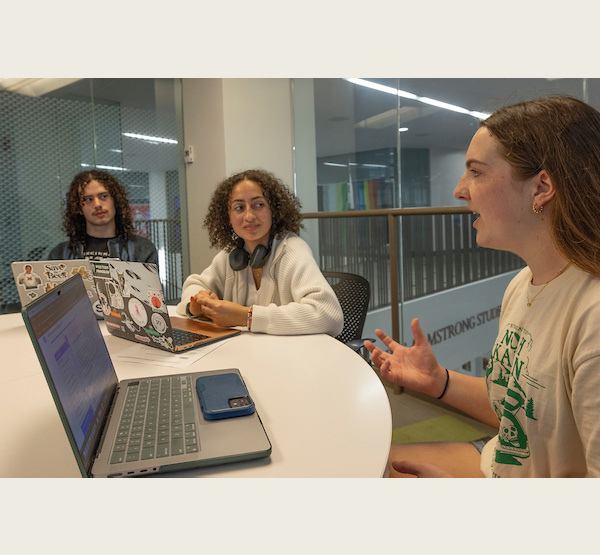More than 100 student leaders participate in Constructive Dialogue Perspectives
Pilot program equips students with tools to communicate across differences
More than 100 student leaders participate in Constructive Dialogue Perspectives

More than 100 student leaders at Miami University spent three weeks participating in a pilot program to learn how to engage in productive discussions with people from different backgrounds.
“It’s been kind of eye opening,” said junior Nick McNeil of Milford, who has a double major in Political Science and Journalism.
“It’s shown a lot of tips on how to have productive conversations when you might have a disagreement,” said McNeil, a student member of Miami’s board of trustees and an intern in Miami’s Office of ASPIRE.
One tip: Try to find something you can connect with in the person’s background or some aspect of the argument that you can acknowledge on understanding why they feel that way, he noted.
Cristina Alcalde, vice president of the Office of Transformational and Inclusive Excellence (OTIE), said they have received positive feedback from the students, who will gather for a dinner on April 10 to discuss their experiences.
Starting this year, OTIE is leading the Constructive Dialogue initiative, in partnership with ASPIRE, the Honors College, and the Menard Family Center for Democracy.
“We launched the pilot program to provide Miami students with concrete tools to engage in respectful and constructive dialogue across differences, including political, religious, racial, cultural, or other forms of difference,” she said.
Communicating across differences
Alcalde noted the student leaders were from a broad range of groups on campus, including Honors College; Government Relations Network; Menard Fellows; College Republicans; College Democrats; Hillel: Association of Jewish Students; Latine Student Alliance; Presidential Fellows; Associated Student Government; Students for Justice in Palestine; Black Student Action Association; Greek organizations; student athletes; and more.
“We know that communicating across differences is an important life skill to be successful in personal and professional spaces, and that it can help reduce polarization and increase a sense of belonging,” Alcalde said. “These would be important goals any year, but as our society becomes increasingly polarized and in the context of an election year, we thought it would be especially useful to launch this year.”
Through its partnership with the Constructive Dialogue Institute, Miami is able to provide the Miami community with access to tools that facilitate dialogue between individuals and groups with different perspectives, values, and beliefs.
“Applicable in all aspects of your life”
John “Jack” Fazio, a senior from Avon Lake who is majoring in Microbiology with a co-major in Premedical Studies, was impressed from the beginning on how complete the program was. He thinks it would be “a great primer” for students getting into leadership positions.
“It would be a really great opportunity to make a regular thing for student leaders. A lot of times, we ask them to navigate conflicts that might or might not be their own, and they do it with whatever skills they have coming in. That can be a really challenging situation,” said Fazio, whose term as a student member of Miami’s board of trustees ended in February.
Maddie Erwin, a junior from Leonardtown, Maryland, who is majoring in Music Education, said the students would work through modules and guided questions.
Erwin, who will be a student orientation undergraduate leader this summer and director of academic excellence for her sorority, Tri Delta, next year, said it has helped her find new ways to communicate.
“I’ve been able to apply it to situations in my house with my roommates already. It’s very applicable in all aspects of your life.”
Aliyah Bing of Dayton, a junior majoring in Architecture who is participating in an Urban Leadership program this summer, said she found it helpful in assessing her communication skills.
“A lot of the lessons have been focused not only on communication but understanding yourself and communicating your ideas effectively as well as listening to other people,” she said.
The program offered various scenarios involving a potential point of conflict.
One example: Two students living across the hall in a residence hall, where one has something offensive displayed on their wall inside their room. That student likes to keep the door open, which makes the offensive object visible outside the room.
During a discussion, Erwin suggested the students could use “I statements” like she learned in the program: “I respect your ability to have your own opinion. I personally feel uncomfortable seeing something like that in a space I’m living in. I know you have your own choices, but would you consider moving it to where I can’t see it or taking it down?”
Added McNeil: “Or just close the door.”

Methods of problem-solving
In a second group that met at Armstrong Student Center the next day, the response to the program also was positive.
“It has brought different methods of problem-solving when there are disagreements,” said Elijah Gahn, a senior from Columbus with a double major in Biology and Organizational Leadership. He is a member of the Louis Stokes Alliance for Minority Participation, an honors program funded by the National Science Foundation.
Jade Dunaway, a sophomore from Fairfield with double majors in Psychology and Individualized Studies, said that often, due to social media, “I think it’s hard to interact with people who have different views than you, and do it civilly. This has taught me to take a step back and reflect on my belief systems and how they are similar to other people’s.”
First-year student Abigail Burnham of Carmel, Indiana, who is majoring in Business Economics, said her group would do reflections at the end of each meeting. That made her realize their similarities.
“No matter what experiences we had coming up, we share similar values or we share similar thought processes on how we think things through,” she said.
Dunaway thinks it would be interesting to pair students who have opposing beliefs.
Expanding the program next fall
Feedback from the student leaders will be taken into consideration.
Alcalde said OTIE hopes to “expand and embed this program across Miami during 2024-25. We are gathering feedback from student leaders who participated in the program this spring, and this will help us as we determine next steps.”
Starting in fall 2024, all Miami faculty, staff, and students will have access to the online resources provided through the Constructive Dialogue Institute, and Alcalde said they will also be offering workshops through OTIE.
The Honors College, for example, is also planning on using the program more broadly next fall.
For 2024-2025, OTIE also is partnering with the Center for Teaching Excellence (CTE) to launch the Faculty Learning Community “Teaching and Learning Across Differences” to support Miami faculty in incorporating Constructive Dialogue skills in classes.
Watch a video testimonial from Miami student Evelyn Morrison on the Constructive Dialogue Institute webpage.